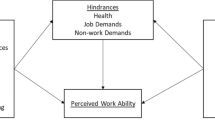Abstract.
Human capabilities theory has emerged as an important framework for measuring whether various social systems promote human flourishing. The premise of this theory is that human beings share some nearly universal capabilities; what makes a human life fulfilling is the opportunity to exercise these capabilities. This essay proposes that the use of human capabilities theory can be expanded to assess whether a company has organized the work environment in such a way that allows workers to develop a variety of human capabilities. This mode of analysis is put forward as a complement to the work of Mihaly Csikszentmihalyi, who has suggested that the key to promoting human well-being in the workplace is the maximization of flow experiences.
Similar content being viewed by others
References
H. Alford M. Naughton (2001) Managing as if Faith Mattered: Christian Social Principles in the Modern Organization University of Notre Dame Press Notre Dame, IN
St. Thomas Aquinas (1984) Treatise on the Virtues, trans. John A. Oesterle University of Notre Dame Press Notre Dame, IN
Aristotle (1985) Nicomachean Ethics, trans. Terence Irwin Hackett Publishing Company Indianapolis, IN
M. Csikszentmihalyi (1990) Flow: The Psychology of Optimal Experience Harper & Row New York
M. Csikszentmihalyi (2003) Good Business: Leadership, Flow and the Making of Meaning Viking New York
H. Gardner M. Csikszentmihalyi W. Damon (2001) Good Work: When Excellence and Ethics Meet Basic Books New York
Pope John Paul SuffixII (1981) ‘Laborem Exercens On HumanWork’ D. O’Brien T. Shannon (Eds) Catholic Social Thought: The Documentary Heritage Orbis Maryknoll, NY 350–392
J. Kotva (1996) The Christian Case for Virtue Ethics Georgetown University Press Washington, DC
M. Nussbaum A. Sen (1993) The Quality of Life Clarendon Press Oxford
M. Nussbaum J. Glover (1995) Women, Culture and Development: A Study of Human Capabilities Oxford University Press New York
Nussbaum, M.: 1988, ‘Nature, Function, and Capability’, Oxford Studies in Ancient Philosophy, Supplementary Vol. 1988, pp. 145–184.
Nussbaum, M.: 1990, ‘Aristotelian Social Democracy’, in R. Douglass, G. Mara and H. Richardson (eds.), Liberalism and the Good (Routledge, New York).
Nussbaum, M.: 1995, ‘Aristotle on Human Nature and the Foundations of Ethics’, in J. E. J. Altham and R. Harrison (eds.), World, Mind, and Ethics: Essays on the Philosophy of Bernard Williams (Cambridge University Press, Cambridge).
M. Nussbaum (2000) Women and Human Development: The Capabilities Approach Cambridge University Press Cambridge
J. Schor (1991) The Overworked American: The Unexpected Decline of Leisure Basic Books New York
J. Schor (1998) The Overspent American: Why We Want What We Don’t Need HarperCollins New York
A. Sen (1993) ‘Capability and Well-Being’ M. Nussbaum A. Sen (Eds) The Quality of Life Oxford University Press New York 30–53
A. Sen (2003a) ‘Development as Capability Expansion’ S. Fukauda-Parr A. K. Shiva Kumar (Eds) Readings in Human Development: Concepts, Measures and Policies for a Development Paradigm Oxford University Press New York 3–16
A. Sen (2003b) ‘Human Capital and Human Capability’ S. Fukauda-Parr A. K. Shiva Kumar (Eds) Readings in Human Development: Concepts, Measures and Policies for a Development Paradigm Oxford University Press New York 35–37
A. Sen (2003c) ‘Foreword’ S. Fukauda-Parr A. K. Shiva Kumar (Eds) Readings in Human Development: Concepts, Measures and Policies for a Development Paradigm Oxford University Press New York vii–xiii
R. Solomon (1999) A Better Way to Think About Business: How Personal Integrity Leads to Corporate Success Oxford University Press New York
W. Spohn (1992) ArticleTitle‘The Return of Virtue Ethics’ Theological Studies 53 60–75
M. ul Haq (2003a) ‘The Human Development Paradigm’ S. Fukauda-Parr A. K. Shiva Kumar (Eds) Readings in Human Development: Concepts, Measures and Policies for a Development Paradigm Oxford University Press New York 17–34
M. ul Haq (2003b) ‘The Birth of the Human Development Index’ S. Fukauda–Parr A. K. Shiva Kumar (Eds) Readings in Human Development: Concepts, Measures and Policies for a Development Paradigm Oxford University Press New York 103–113
United Nations Development Programme (UNDP): 1990, Human Development Report (Oxford University Press, New York). Also available online at http://hdr.undp.org/reports/global/1990/en/.
United States Conference of Catholic Bishops: 1986, Economic Justice for All (United States Catholic Conference, Washington, DC).
L. Yearly (1990) ArticleTitle‘Recent Work on Virtue’ Religious Studies Review 16 1–9
Author information
Authors and Affiliations
Corresponding author
Rights and permissions
About this article
Cite this article
Vogt, C.P. Maximizing Human Potential: Capabilities Theory and the Professional Work Environment. J Bus Ethics 58, 111–123 (2005). https://doi.org/10.1007/s10551-005-1423-6
Issue Date:
DOI: https://doi.org/10.1007/s10551-005-1423-6




